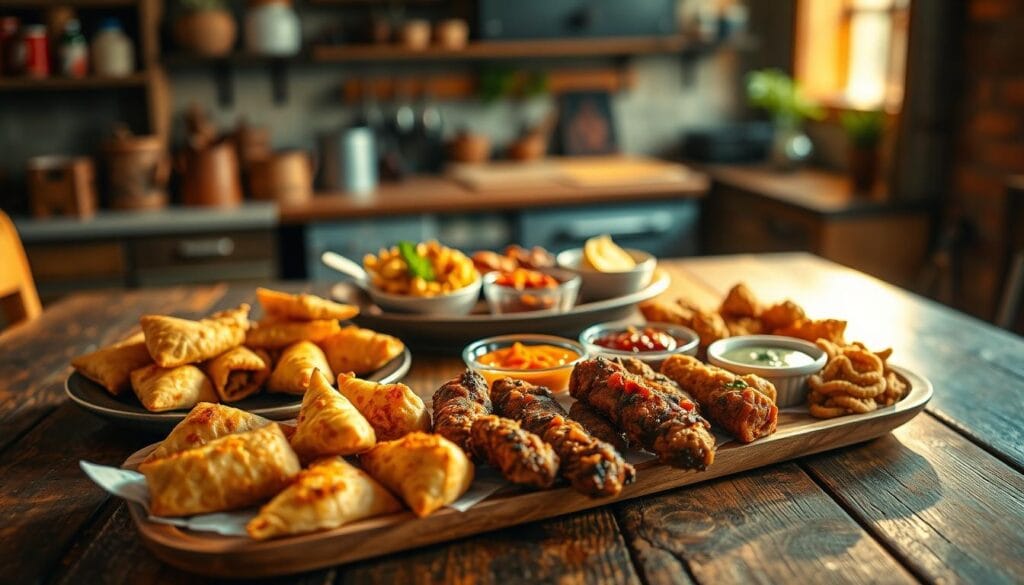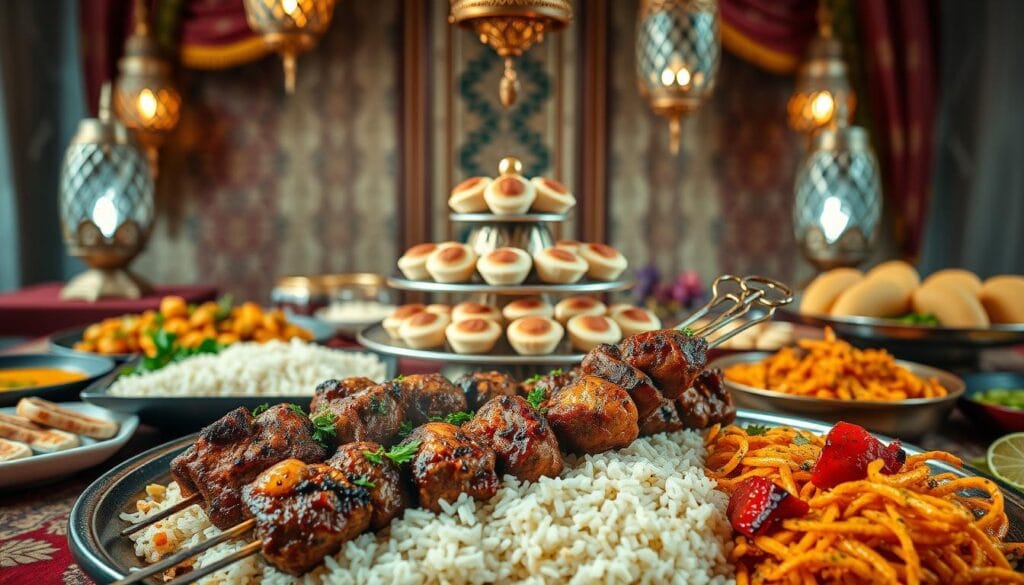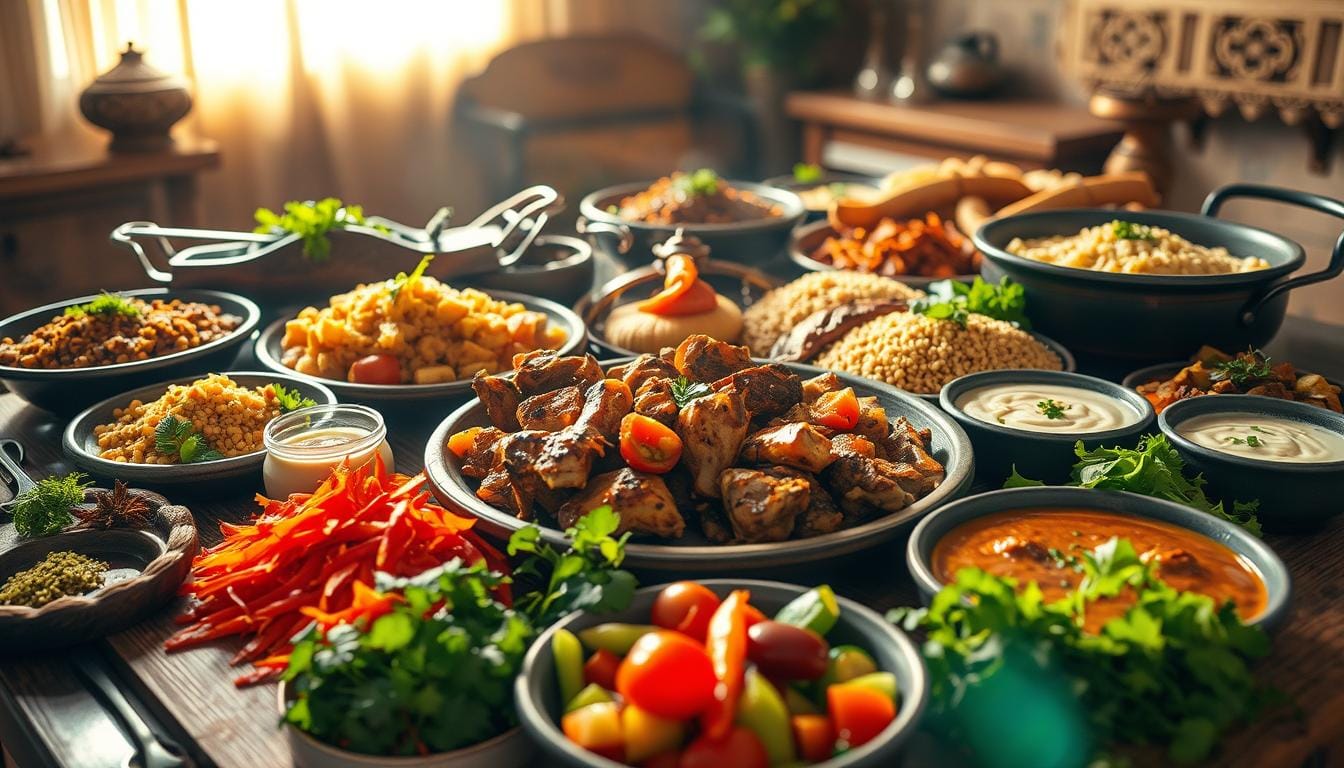Exploring halal food recipes, I find rich flavors and diverse cuisines that meet our dietary needs. The halal food industry is expected to hit $2.6 trillion by 2023. Cooking with halal meat offers a chance to make tasty and healthy meals. Whether you seek simple or complex recipes, halal cuisine has it all.
Food has the power to unite us, and halal food is no different. It’s not just delicious but also reflects our values by focusing on animal welfare. Join me as we explore halal food recipes. We’ll dive into traditional dishes and modern twists, including easy recipes for any time.
Key Takeaways
- Halal food recipes are in high demand, with the halal food industry projected to reach $2.6 trillion by 2023.
- Cooking with halal meat can be a great way to create delicious and healthy meals.
- Halal food emphasizes ethical treatment and humane slaughter of animals, aligning with our values.
- Easy halal recipes are perfect for any occasion, and can be found in a variety of cuisines.
- Halal food has the power to bring people together, and is a great way to explore new flavors and cuisines.
- With its growing popularity, halal food is becoming increasingly accessible, with many local halal markets and restaurants offering a wide range of halal food options.
- Whether you’re looking for traditional dishes or modern twists, there’s something for everyone in the world of halal food recipes.
What is Halal Food?
Exploring halal food means learning about its importance and what it is. Halal foods are those allowed by Islamic law. On the other hand, haram foods are forbidden. This tradition focuses on treating animals kindly and saying prayers when slaughtering them.
Halal food recipes offer a wide range of tasty options. You can find everything from seafood to fruits and vegetables. Many see halal butchering as a more humane way to get meat.
To follow halal rules, you need to use different tools for halal and non-halal foods. You can also look for halal certification logos on products. The halal food market is expected to grow to $3.2 trillion by 2027, showing its increasing popularity.
Key points about halal food include:
- Humane treatment of animals
- Recitation of prayers during slaughter
- Separate utensils and cookware for halal and non-halal foods
- Halal certification logos for compliant products
Learning about halal food helps us see the effort put into making these dishes. Whether you want to try new halal food recipes or explore traditional halal dishes, there’s much to discover.
The Basics of Halal Cooking
Exploring halal cuisine means learning the basics of cooking. It’s about using fresh, high-quality ingredients. This includes halal meat, spices, and herbs. Halal cooking ideas range from traditional dishes like biryani and shawarma to new takes on old favorites.
To start with halal cooking, you need the right ingredients and methods. Essential items include olive oil, garlic, ginger, and spices like cumin, coriander, and turmeric. For quick halal recipes, grilling, roasting, or sautéing are key to enhancing flavors.
- Grilling: perfect for meats like chicken, beef, and lamb
- Roasting: great for vegetables and root vegetables like carrots and potatoes
- Sautéing: ideal for cooking spices and herbs to bring out their flavors
Mastering these basic cooking methods and using the right ingredients lets you make many tasty halal dishes. These are great for any time or event.
Delicious Breakfast Ideas
Breakfast is a time for family and friends to come together. In Turkey, breakfast is filled with simit and menemen. It’s a great chance to get creative with halal meal prep.
A Turkish breakfast is full of fresh veggies, cheeses, and olives. To spice up your mornings, try adding these to your meals. Make a shakshuka with fresh veggies and spices, or some banana oatmeal pancakes for a healthy start.
For more ideas, check out Gustative Recipes. They have recipes like grilled halal chicken breast and vegetable biryani. With a bit of creativity, you can make a halal-friendly breakfast spread.
Exploring different cuisines can lead to amazing breakfasts. Whether you want something savory or sweet, there’s a halal option for you. Start your day with a delicious halal breakfast and make meal prep easy with these tasty recipes.
Tantalizing Lunch Recipes
Exploring halal cuisine opens up a world of tasty lunch options. I’m excited to share my top best halal recipes with you. These dishes, from the Middle East to Asia, will make your taste buds dance.
Grilled Chicken Shawarma Wrap
Shawarma is a favorite in halal cuisine. It’s tender chicken, crispy veggies, and tangy tahini sauce all in one. Serve it with steamed veggies or a fresh salad for a complete meal.
https://www.youtube.com/watch?v=38IiVYKv7aY&pp=ygUJI2hhbGFjaGVm
Flavorful Falafel Salad
For a light and refreshing meal, try our falafel salad. It’s crispy falafel, mixed greens, and a zesty lemon-tahini dressing. It’s a best halal recipe for a healthy lunch. Falafel and shawarma are gaining fans worldwide for their authentic flavors.
Hearty Dinner Options
Exploring halal food recipes, we find many traditional dishes great for dinner. Spicy lamb curry and vegetable biryani are perfect for warming your belly. Try chorizo dinner recipes with steamed rice or naan bread for a tasty meal.
Popular halal dinner recipes include spicy lamb curry, vegetable biryani, and chicken shawarma. These dishes are not only tasty but also healthy. They use fresh ingredients and traditional cooking methods. Adding a side of white sauce or a fresh salad can make your dinner even better.
Here are some tips for a delicious and healthy halal dinner:
- Use fresh and high-quality ingredients, such as Basmati rice and boneless chicken thighs.
- Choose traditional cooking methods, such as grilling or stir-frying, to preserve the nutrients in your food.
- Experiment with different spices and seasonings, such as cumin and coriander, to add flavor to your dishes.
By following these tips and trying new halal food recipes, you can make healthy and tasty dinners. Whether for yourself or a big group, halal recipes have something for everyone. So, start exploring traditional halal dishes today!
Exquisite Halal Snacks
Snacks are key in halal cooking, giving us quick energy and satisfying our cravings. With halal cooking ideas and quick halal recipes, we can make many tasty and healthy snacks. Options range from crunchy samosas to classic hummus and veggie platters.
Some favorite halal snacks include:
- Crunchy samosas with mint chutney
- Classic hummus and vegetable platter
- Falafel with tahini sauce
These snacks are not only delicious but also simple to prepare. They use fresh, quality ingredients. With a bit of creativity, we can make these snacks into quick halal recipes for any time.

Looking for a healthy snack or a treat? Halal cooking ideas and quick halal recipes offer inspiration. They help us create snacks that are both delicious and fulfilling.
Delectable Desserts for All Occasions
Desserts are key in many celebrations and gatherings, especially in halal cuisine. From classic treats like baklava and kanafeh to new creations, there’s a lot to choose from. Desserts can add fun to your meal prep.
Popular desserts for special times include cardamom rice pudding, honey-drizzled baklava stacks, and mango custard. These desserts are tasty, simple to make, and great for meal prep. They’re perfect for any occasion or just for a sweet treat.
Here are some popular desserts for special occasions:
- Cardamom rice pudding: a traditional dessert made with rice, milk, and cardamom
- Honey-drizzled baklava stacks: a modern twist on the classic baklava recipe
- Mango custard: a sweet and creamy dessert made with mango puree and custard
Halal Food for Special Occasions
For special occasions, we aim to serve the best halal recipes. These dishes should be delicious, authentic, and meaningful. For instance, a creamy halal chicken breast pasta is great with steamed veggies or a fresh salad. It’s perfect for any special event.
Popular halal dishes for these times include Moroccan Tajine, Beef Koftas, and Paya soup. These dishes are not just tasty but also carry deep cultural significance. They’re ideal for making any occasion memorable. You might also think about serving Meatball Pad Thai, Baked meatballs, or Sautéed beef liver. They’re not only tasty but also good for your health.
Here are some tips for serving halal food at special occasions:
- Choose dishes that are meaningful and authentic, such as traditional Eid feasts or wedding recipes.
- Consider the dietary needs and preferences of your guests, such as serving a variety of options for those with dietary restrictions.
- Use high-quality ingredients and cooking methods to ensure that the food is not only delicious but also safe and healthy to eat.

Tips for Creating Your Own Halal Recipes
The world of halal food recipes is vast and full of tasty options. It’s time to get creative and try out your own easy halal recipes. Remember, the most important thing is to have fun and be open to new tastes and methods.
Substitutions and Adaptations
Don’t hesitate to swap out ingredients in recipes. If you can’t find a certain halal ingredient, look for a similar one. For instance, you can use halal-certified Greek yogurt instead of regular yogurt in sauces and marinades.
Experimenting with Spices and Flavors
Halal cooking is all about using vibrant spices and bold flavors. Try mixing different herbs, spices, and aromatics to make dishes that stand out. Don’t be scared to try new things. You might find your new favorite halal recipe!
FAQ
What is the definition and significance of halal food?
Halal food is what Muslims can eat according to Islamic law. It’s all about using clean, pure, and ethically sourced ingredients. This food is important because it follows religious rules and encourages mindful eating.
What are the key differences between halal and kosher?
Halal and kosher share some similarities but have big differences. Halal focuses on animal treatment and ingredients, while kosher has its own food preparation rules. Each reflects the unique traditions of their faiths.
What are the essential ingredients and common cooking methods used in halal recipes?
Halal cooking uses aromatic spices, herbs, and seasonings for flavor. Techniques like grilling, sautéing, and slow-cooking are used. These methods keep flavors natural and follow halal rules.
What are some delicious halal breakfast ideas?
Our halal breakfast recipes include shakshuka and banana oatmeal pancakes. They’re healthy, tasty, and meet your dietary needs.
What are some tantalizing halal lunch recipes?
Our halal lunch recipes feature dishes like grilled chicken shawarma and falafel salads. They’re authentic, delicious, and perfect for lunch.
What are some hearty halal dinner options?
Our halal dinner recipes include spicy lamb curry and vegetable biryani. They showcase Islamic cuisine’s rich flavors and meet your dinner needs.
What are some exquisite halal snack ideas?
Our halal snack recipes include samosas, hummus, and vegetable platters. They’re quick, delicious, and perfect for snacking.
What are some delectable halal dessert options?
Our halal desserts, like cardamom rice pudding and baklava, are great for any occasion. They satisfy your sweet tooth while following your dietary preferences.
What are some halal food ideas for special occasions?
Our halal recipes are perfect for Eid feasts and wedding menus. They showcase Islamic cuisine and meet your dietary needs.
How can I create my own halal recipes?
We’ll share tips for making your own halal recipes. You’ll learn about substitutions, experimenting with spices, and more. Our goal is to inspire your creativity and help you improve your halal cooking.
We are interested in your feedback
There are no reviews yet. Be the first one to write one.

